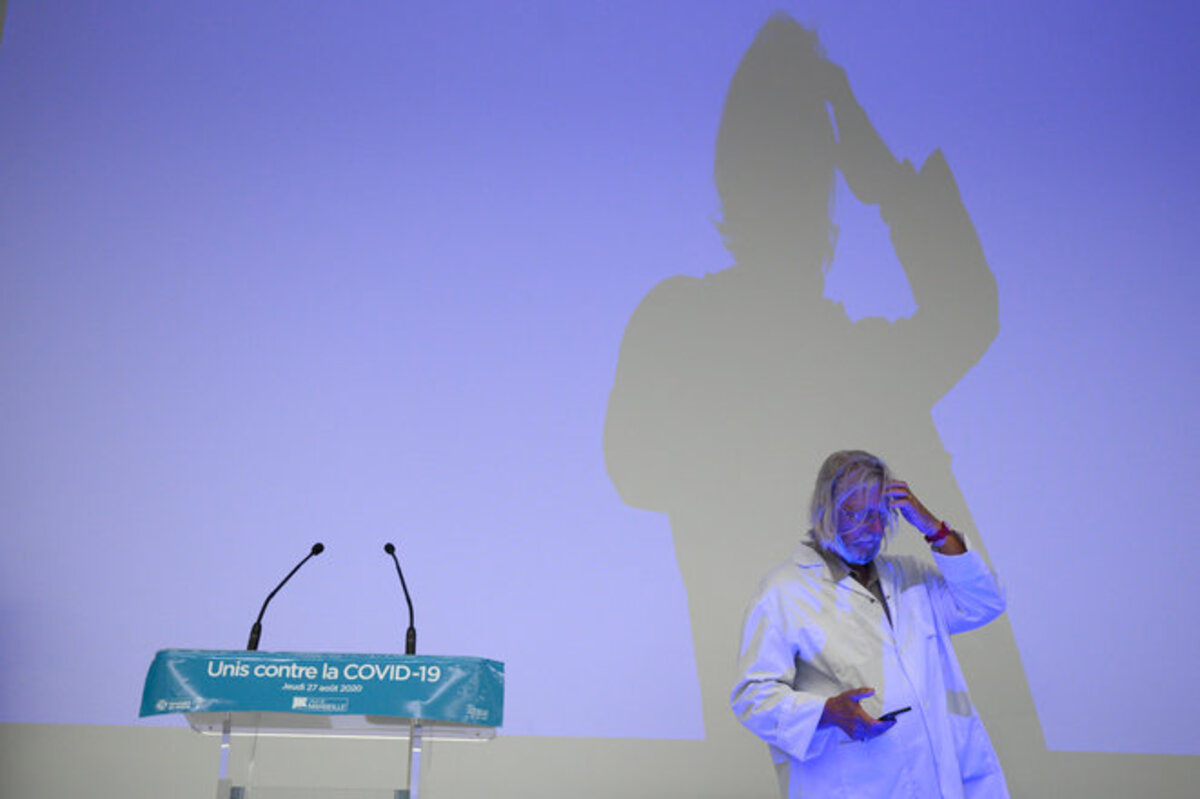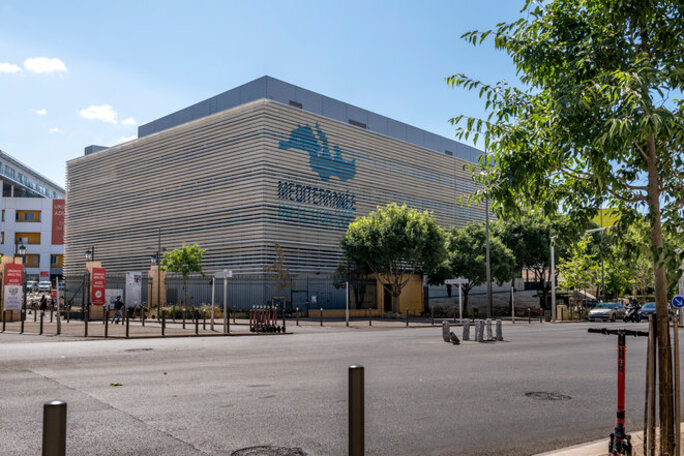Members of staff working under French microbiologist Didier Raoult, who last year attracted worldwide attention for his championing of the anti-malaria drug hydroxychloroquine as an effective medication for the prevention and treatment of Covid-19, have accused him of falsifying biological results to support his claims about the drug, Mediapart can reveal.
The published results of a study led last year by Professor Raoult, which concluded on the effectiveness of hydroxychloroquine in treating Covid-19, adding that it was even more effective when taken with the antibiotic azithromycin, led then US president Donald Trump to tweet that it could be "one of the biggest game changers in the history of medicine”.
At the time, Covid-19 vaccines were in the research stage. Ignoring the opinion of the director of the US National Institutes of Allergy and Infectious Diseases, Anthony Fauci, who dismissed the supposed benefits of hydroxychloroquine against Covid-19, Trump called for it to be made “immediately” and widely available as medication against Covid-19.
The results of Raoult’s study, cited by Trump, were summarised in a preliminary paper published on March 17th 2020 in the International Journal of Antimicrobial Agents. But two weeks later, the publisher of the journal, the International Society of Antimicrobial Chemotherapy, issued a statement saying the study "does not meet the Society's expected standard, especially relating to the lack of better explanations of the inclusion criteria and the triage of patients to ensure patient safety."
Last year, international trials of hydroxychloroquine on patients with severe Covid-19, including one study coordinated by the World Health Organization, found it to be of no benefit.
Raoult, 69, is executive director of the Institut Hospitalo-Universitaire (IHU) Méditerranée Infection, a foundation based in the southern city of Marseille, and the active head of its unit of research into infectious and emerging diseases. The IHU he leads was created in partnership with the University of Aix-Marseille, France's Institute of Research for Development (IRD), and the Marseille hospital administration.

Enlargement : Illustration 1

A controversial figure, Raoult has previously been accused by his peers of biased research results and failing to apply scrupulous methodology, which he strongly contests.
Last month Mediapart and French news weekly Le Point reported how staff at the Marseille IHU accuse him of carrying out unauthorised experiments on patients with cocktails of drugs to treat tuberculosis, and which reportedly led to serious complications for some of those who took part in the experiments. Raoult firmly denied the allegations, which are the subject of ongoing official enquiries.
Now Mediapart can reveal that several staff involved in research led by Raoult, and who include biologists, doctors and research assistants, have denounced what they allege is the falsification by Raoult of scientific results in order to show the effectiveness of hydroxychloroquine against Covid-19.
Didier Raoult did not respond to requests for comment on the accusations.
The complaints were made in a series of confidential interviews with members of staff at the IHU which were conducted in October by their principal employers, the Aix-Marseille university, the Marseille public health and hospital administration (AP-HM), the IRD and France’s national institute of health and medical research, INSERM.
The interviews were agreed on the basis that the identities of those questioned would remain undisclosed in public, due to concerns over eventual professional reprisals both within and outside of the IHU. However, Mediapart has obtained access to documents recording the accusations they made against Raoult, which also included disturbing accounts of a climate of bullying and intimidation within the IHU, and has spoken to some of those questioned.
“For years, there has been no veritable science behind the publications of the IHU,” declared one of the doctors who was questioned. “The results presented have to correspond with the hypotheses of Didier Raoult. In the case of the contrary, the people concerned might be publicly devalued, with doubt cast on their competence.”
Another of the staff interviewed last month said the “reinforced mediatisation of Didier Raoult” created a “climate of cult of personality”, and spoke of “videos of Didier Raoult constantly playing inside the [IHU] building”. Another spoke of staff meetings attended by Raoult where “if one asks questions, the answer is often ‘shut up, you’re not paid to think’”.
It was during the first wave in France of the coronavirus epidemic, in early 2020, when Raoult set his teams to work on hydroxychloroquine, while a number of virologists in France expressed reservations over Raoult’s unproven public claims that the anti-malaria medication, which is also used against autoimmune diseases like lupus, had a positive effect against Covid-19.
In the interviews conducted last month, staff said that it was during the patient trials of hydroxychloroquine led by Raoult that they witnessed the falsification of biological results in order to claim the drug had beneficial effects against Covid-19. They said this involved altering the results of PCR (polymerase chain reaction) tests for coronavirus infection, which causes Covid-19, in a comparative study of a group of patients from the Marseille IHU, who were given hydroxychloroquine, and another group of patients from a hospital in the city of Nice, who were not given it.
They alleged that because the results had initially not, as one put it, “gone in the sense of Didier Raoult”, the cycle level at which the PCR tests would return a positive result of infection was modified, leading to a higher number of negative results for the patients from Marseille. What is known as the cycle threshold (Ct) value is the number of cycles needed for the PCR test to detect the coronavirus. In the case of Raoult’s comparative study, the Ct value in PCR tests of the Marseille patients was reduced to 34 cycles, while PCR tests of those in Nice were kept at the initial 39 cycles. The different criteria used on the two patient groups therefore resulted in the conclusion that hydroxychloroquine was effective in combating Covid-19.
During the staff interviews in October, one of them alleged that Raoult “removed the biology doctors from the schedules, ‘so that they took a rest’, and in exchange put in place software to automate the declaration of results into the AP-HM [Marseille healthcare and hospital administration] software, with no prior validation from the biology doctors”.

Enlargement : Illustration 2

It was several months later, on July 22nd 2020, when the results of a study involving Professor Xavier de Lamballerie, head of an IHU unit of research into emerging viruses, and other scientists, were published in a paper in the weekly scientific journal Nature. Their study was of the effects of hydroxychloroquine on macaques infected with coronavirus. They concluded that their findings “do not support the use of HCQ [hydroxychloroquine], either alone or in combination with AZTH [azithromycin], as an antiviral drug for the treatment of Covid-19 in humans”. Two months earlier, writing in the monthly journal Antiviral Research, Lamballerie had already advised caution over the supposed effectiveness of hydroxychloroquine.
One member of the IHU staff told Mediapart that he deplored how a high-profile visit to the IHU by French President Emmanuel Macron in April 2020 had bolstered the sentiment that the boss was untouchable. Macron made the trip to Marseille during France’s first lockdown to hold discussions with Raoult, whose claims by then had attracted wide public attention, about the possible use of hydroxychloroquine to combat the Covid epidemic.
The reluctance of staff to speak out earlier was, according to some of them, also because of a climate of fear. One spoke of “insulting and threatening” graffiti discovered on the walls of the workplace buildings of people critical of Raoult. This September, the newly appointed director of the AP-HM hospital administration, François Crémieux, who has argued for Raoult's departure from the IHU, was the target of graffiti which read “Crémieux clear off”. There were also accusations that Raoult’s deputy, Michel Drancourt, was an intimidating character whose angry outbursts left some in tears after staff meetings.
A report published in July this year by French daily Le Monde revealed how IHU biology professor Éric Chabrière, a former army reservist who is close to Raoult, targets the latter’s critics on Twitter. In March, Chabrière posted a message addressed to Christian Lehmann, a doctor and columnist with French daily Libération, in which he said “Lehmann is one of those responsible for the fakenews [sic] about the toxicity of HCQ [hydroxychloroquine]”, adding later in his post that, “for the fakemeds, I’m hesitating between two chastisements post-crisis. There should be a return of the good old traditions”. That was followed by illustrations of torture methods.
Yet another reason that discouraged staff to officially complain about the practices within the IHU is the previous passive approach on the part of the Aix-Marseille university, the IRD and the AP-HM, which are supposed to enforce and uphold medical and scientific ethics in the institute.
As previously reported by Mediapart, the practices within the Marseille IHU had, following inspections carried out in 2017, led to Raoult losing his affiliation to France’s prestigious interdisciplinary scientific research network, the CNRS , and also with the no-less prestigious French national institute of health and medical research, INSERM (see more here). Already, researchers and students with the IHU had complained of the unhealthy climate within the institute.
In September 2020, during a general assembly meeting, at which were present representatives of Aix-Marseille university, the IRD and the French army healthcare services administration, the problems were again raised.
During the confidential interviews last month, several of the staff complained of feeling “abandoned” by their employers. “They consider that nothing has changed” despite the alerts about the functioning of the IHU, concluded a summary of the meetings, which added that they felt that “Didier Raoult, the heads of his services and the heads of branches remained untouchable”.
Added to which, there is also the sentiment that after Raoult leaves the institute that after Raoult leaves the institute – his officially overdue retirement is now planned for next year, when he will turn 70 – little will change because his loyal allies within the IHU will succeed him.
“There should be questions asked about the support Didier Raoult was able to benefit from,” said one of the IHU staff. “These problems are not new but everyone closes their eyes. In September 2020, we asked that the [IHU’s partner institutions] do what’s necessary to protect the personnel. It took more than a year before the CHSCT [workplace conditions and safety inspection agency] was called up. Covid certainly slowed things, but it’s not the only reason.”
“The authorities which are supposed to manage the IHU, like the [Aix-Marseille] university or the Institute of Research for Development [IRD], did nothing to counter the practices of Didier Raoult, which they could have been unaware of, as much the management through terror as the non-respect of rules of ethics and deontology,” he added. “Through their inaction, all of them have their share of responsibility in the illegal practices of the IHU.”
Questioned about the gravity of the accusations raised in the staff interviews, AP-HM director François Crémieux declined to comment. Also questioned on the subject, the Aix-Marseille university similarly declined to make any comment, but underlined that investigations are underway by both the public social affairs inspectorate, IGAS, and the inspectorate for education, sport and research, the IGESR.
The IRD and INSERM did not respond to questions submitted to them.
-------------------------
If you have information of public interest you would like to pass on to Mediapart for investigation you can contact us at this email address: enquete@mediapart.fr. If you wish to send us documents for our scrutiny via our highly secure platform please go to https://www.frenchleaks.fr/ which is presented in both English and French.
-------------------------
- The original French version of this report can be found here.
English version by Graham Tearse


